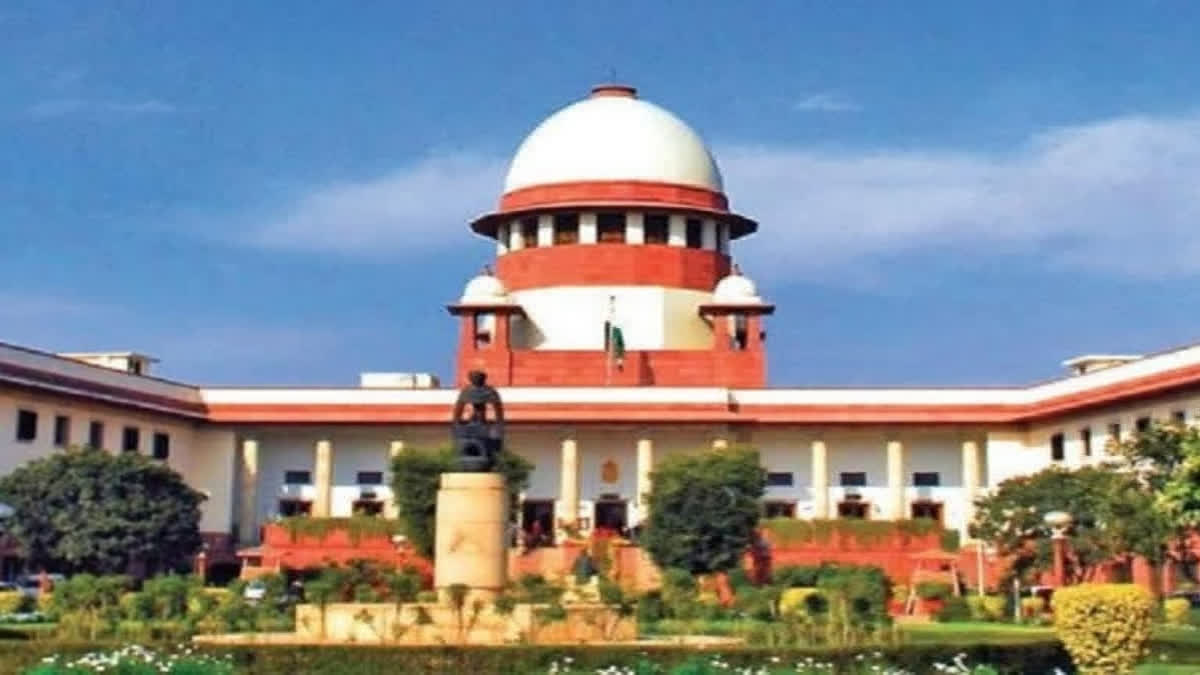New Delhi: The Supreme Court on Tuesday said the legal principle 'bail is the rule, jail is an exception' applies to offences even under special statutes like the Unlawful Activities (Prevention) Act. A bench of justices Abhay S Oka and Augustine George Masih said if courts were to begin denying bail in deserving cases, then it would be a violation of fundamental rights while granting bail to a man, Jalaluddin Khan, accused under UAPA, stringent anti-terror law.
The bench said that the allegations of the prosecution may be very serious, but the court has to consider the case for bail under the law. The bench stressed that bail is the rule and jail is the exception applies even to special statutes. “If courts start denying bail in deserving cases, it will be a violation of rights guaranteed under Article 21," said the bench.
The bench said when there is a case for grant of bail the court should not hesitate to grant bail, while allowing Khan’s appeal against the judgment of the Patna High Court, which refused to grant him bail. The petitioner was booked under the stringent provisions of the UAPA and other Sections of the now-defunct IPC for renting a floor of his house to alleged members of Popular Front of India (PFI), a banned organisation. According to the National Investigation Agency (NIA), a criminal conspiracy was hatched to carry out acts of terror and violence, leading to an atmosphere of terror.
The accused arranged rented accommodation in Ahmad Palace in Phulwarisharif (Patna) and used the premises for training in the commission of acts of violence, and holding criminal conspiracy meetings. The Bihar police had received information about a plan of accused persons to cause disturbance during the proposed visit of Prime Minister Narendra Modi in 2022. Khan’s residence was raided by police in July 2022.
No Prima Facie for Commission Of Offences Under UAPA
The apex court said: "We must mention here that the Special Court and the High Court did not consider the material in the charge sheet objectively. Perhaps the focus was more on the activities of PFI, and therefore, the appellant's case could not be properly appreciated".
The bench said even in a case like the present case where there are stringent conditions for the grant of bail in the relevant statutes, the same rule holds good with only modification that the bail can be granted if the conditions in the statute are satisfied.
"On plain reading of the charge sheet, it is not possible to record a conclusion that there are reasonable grounds for believing that the accusation against the appellant of commission of offences punishable under the UAPA is prima facie true," said the bench, in its judgment.
The bench said there is not even an allegation in the chargesheet that the appellant was a member of any terrorist gang.
PFI is not a terrorist organisation
The bench said as regards the second part of being a member of a terrorist organisation, as per Section 2(m) of UAPA, a terrorist organisation means an organisation listed in the first schedule or an organisation operating under the same name as the organisation was listed.
"The chargesheet does not mention the name of the terrorist organisation within the meaning of Section 2(m) of which the appellant was a member. We find that the PFI is not a terrorist organisation, as is evident from the first schedule," said the apex court.
Justice Oka, who authored the judgment on behalf of the bench, said: "Assuming that the appellant knew that co-accused Athar Parvez was associated with PFI, it is not listed as a terrorist organisation within the meaning of Section 2(m) of UAPA. Moreover, the chargesheet does not contain any material to show any connection of the appellant with PFI before letting out first floor premises to accused no.1”.
Justice Oka said taking the chargesheet as correct, it is not possible to record a prima facie finding that the appellant knowingly facilitated the commission or preparation of terrorist acts by letting out the first floor premises. "Again, there is no allegation in the chargesheet against the appellant that he organised any camps to impart training in terrorism," he said.
"Assuming that the co-accused were indulging in terrorist acts or were making any act preparatory to the commission of terrorist acts, there is absolutely no material on record to show that there was any conspiracy to commit any terrorist act to which the appellant was a party. There is no material produced on record to show that the appellant advocated, abetted, advised, or incited the commission of terrorist acts or any preparatory activity", said Justice Oka.
Witness Z statement
The bench noted that protected witness Z stated that in the meeting, subjects such as the expansion of the organisation, basic and advanced training of PFI members and future PFI plans were discussed, and a direction was given to trained PFI cadre to eliminate one Nupur Sharma.
The bench said that in the statement of protected witness Z, all that is not found, and added, "In fact, protected witness Z stated that during the meeting, emphasis was given on strengthening the status of Muslims, imparting them basic and advanced training and strengthening the status of education, politics and administration of Muslims and Muslim empowerment."
"Going by the witness's version, we find that there was no discussion about the activities of PFI in the meeting held on 29th May 2022. According to the witness, the direction to kill Nupur Sharma was issued in June 2022 and not in the meeting of 29th May 2022," said the bench.
The bench said the material portion of witness Z's actual statement has been completely distorted in paragraph 17.16 of the chargesheet and several things which protected witness Z did not state have been incorporated in this paragraph. “Unfortunately, paragraph 17.16 attributes certain statements to protected witness Z, which he did not make. NIA owes an explanation for that. The investigating machinery has to be fair. But, in this case, paragraph 17.16 indicates to the contrary", said the bench.
Read more: SC Expresses Shock Over Delay In Consideration Of UP Prisoner's Remission Plea




